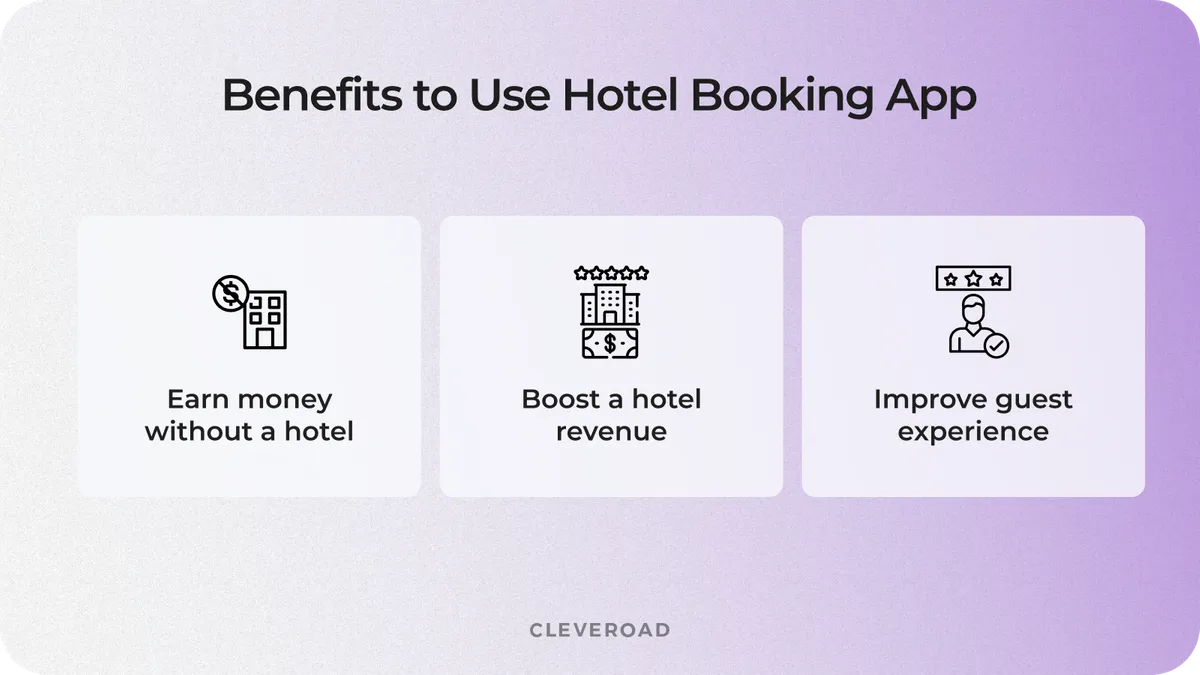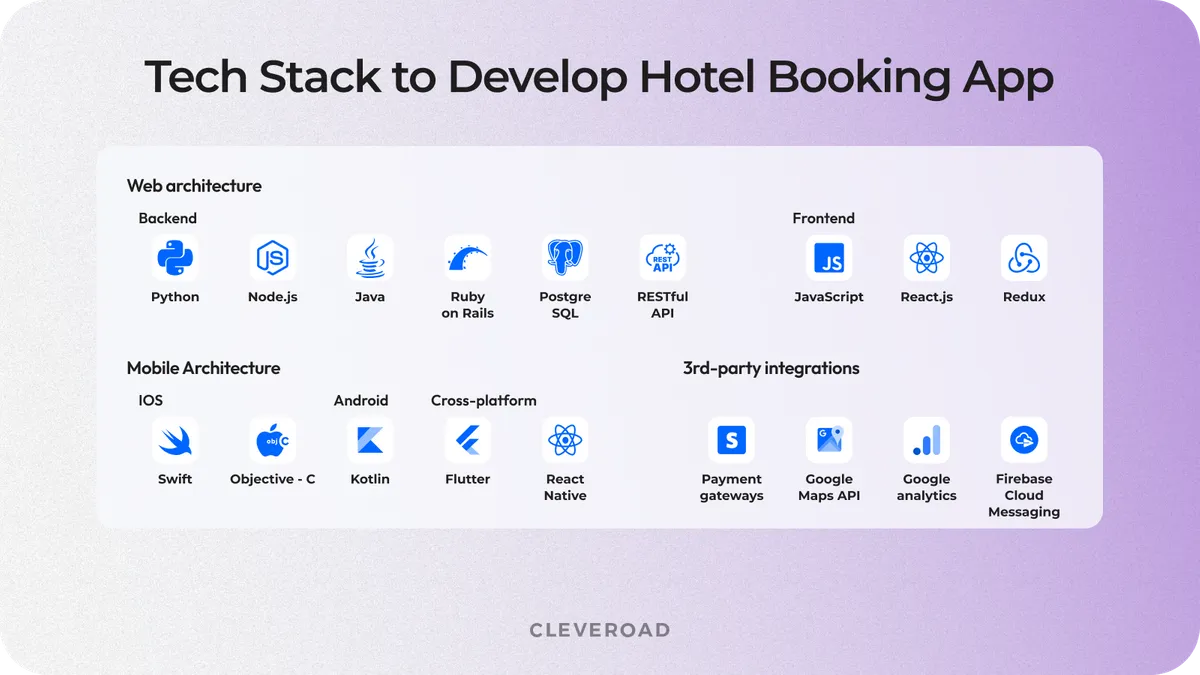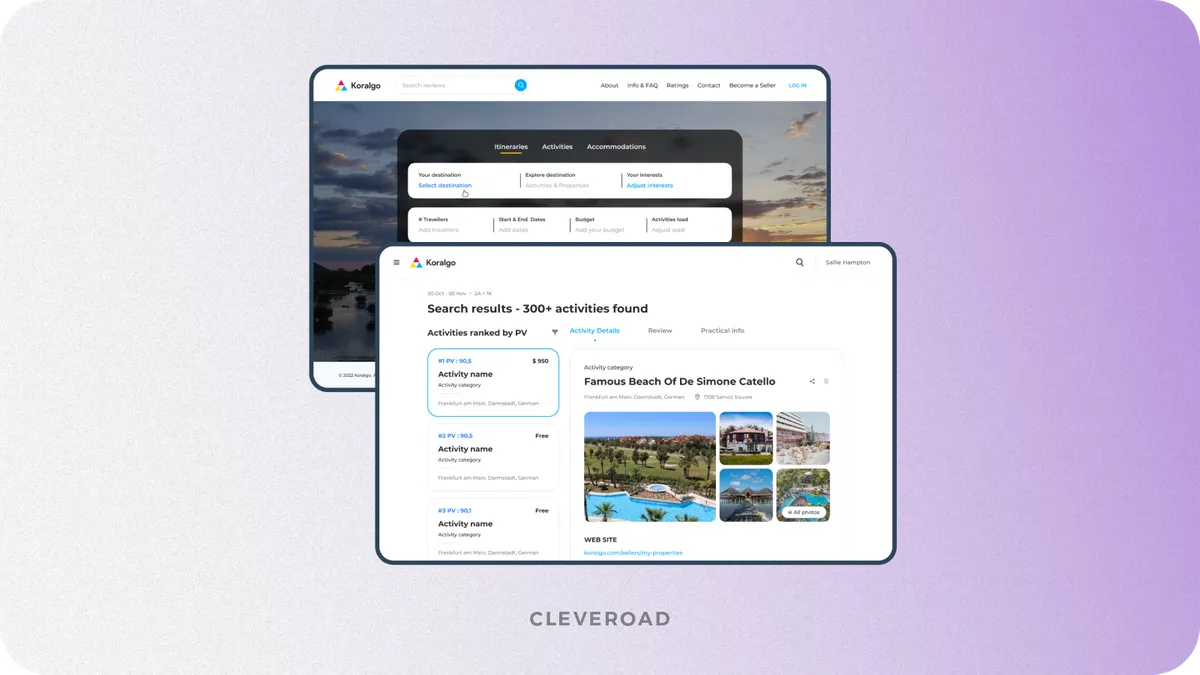Hotel Booking App Development: Cost, Features, and Monetization Models
Updated 14 May 2025
17 Min
19514 Views
Hotel app development pushed the eTravel industry forward, stimulating phenomenal growth. That’s why not only hospitality professionals are wondering how to make a hotel booking app but many startups and entrepreneurs from various industries too. At Cleveroad, we've developed a bunch of different booking software, particularly for hotels, hotel chains, spa and wellness centers, gyms, and so on. One of them is Koralgo – an online booking for travelers and travel providers, allowing customers to find the property or activity that fulfills their needs.
Based on our experience, we’ll guide you through hotel booking app development aspects: from types of hotel mobile apps to required features and monetization models. You’ll also learn how to build a high-quality and client-oriented product. All this information will help you with your own hotel booking app development.
Why You Need to Start Hotel Booking App Development
Remaining competitive in the hotel industry involves adopting digitalization. It begins with smart mobile app development for the domain. Let’s discuss why and how hotel app development will help your business.
Market potential for hotel booking app development
We decided to gather some optimistic predictions to strengthen your decision to enter the market with your own hotel booking services. The recent research by Statista indicates that:
- The 'Hotels' segment of the travel & tourism market stands for the largest ones, with revenue estimated to reach $955.94 billion in 2025, rising from $1.11 trillion in 2029.
- The global number of users in the Hotels market is forecasted to rise to 1.81 billion users by 2029. With such a large user base, you’ll definitely find your niche.
- 75% of overall revenue in the Travel & Tourism industry will come from online sales by 2029.
- The Average Revenue Per User (ARPU) is expected to attain $450.44; which means if you have 100,000 users for your hotel booking app, your annual revenue would be $45.04 million.
The stats above clearly indicate that creating an app for travel booking is still a good idea for anyone thinking about this opportunity. Since the demand is constantly growing, there is enough market space for healthy competition, and you have a chance of taking a large slice of the cake.
Benefits of using hotel booking apps for your business
New hotel players are always under the stress of being competitive, efficient, and customer-centric. A well-conceptualized mobile app can address all these issues while unleashing new sources of revenues. Here are some good reasons why creating a hotel reservation app is essential for any hotel player — even for entrepreneurs starting a hotel aggregating startup without a property of their own.
Earn money even if you do not own a hotel
You don’t necessarily need to own property in order to build a hotel booking application and make it a profitable business. Moreover, you may build a hotel booking platform as a metasearch engine by aggregating listings and monetizing through affiliate links, advertising, or paid listings. A reputable hotel booking app development company can design a product centered around generating revenue from the ground up and a custom booking system logic to fit your business model.
Boost hotel revenue with smart upselling
For hotel operators, a booking app becomes a direct sales and communication channel. You have the ability to promote personalized things like room upgrades, or even local experiences, all through features in the app. That targeted approach to booking app features improves both guest satisfaction and the average revenue per stay when you build an app with a value-added mindset.
Improve guest experience and loyalty
Guests value convenience, and a robust hotel booking app enables them to book, manage, and customize their stay with ease. By using insights and preferences to automate recommendations, you help your app build end-to-end, memorable experiences and reduce friction. A professional hotel booking app development firm ensures that your interface is user-friendly and interactive, and makes users come back repeatedly.

Benefits of using hotel booking app for your business
Key Types of Hotel Booking Apps
If you're a hotelier, we suppose you already know what you need to create hotel booking app for. Or maybe you want to partner with other companies to complement the app with car rental and booking flights? It's up to your business objectives.
For your information, we’ve categorized key groups of hotel booking apps, so you can briefly overview each hotel booking app's features and choose between unfamiliar applications (if it’s relevant).
OTA apps
Online Travel Agency (OTA) apps are platforms aggregating hotel listings from various sources. These apps allow users to compare prices, availability, and amenities from multiple hotels at once. OTA apps typically offer a wide range of hotels to choose from, including budget options, boutique hotels, and luxury accommodations. Booking.com, Expedia, and TripAdvisor give an idea of how to create hotel booking app of this type.
AI concierge and smart room control apps
These hotel mobile app development solutions act like a personal concierge in your pocket. Guests can use voice or chat features to get help or control their hotel rooms straight from their phones. Thanks to AI and IoT, things like adjusting the lighting, setting the room temperature, or even ordering room service have become effortless.
The idea here is to make the in-room booking experience super smooth and totally personalized. To develop an app like this, hotels usually team up with a mobile app development company that knows their way around smart tech. Great examples? Hilton's Connected Room and Marriott's Mobile Key: both right there in the app store.
Read our article to know more about concierge app development for your business!
Hotel chain apps
Direct mobile app development for hotels is required by individual hotels or hotel chains to facilitate direct bookings. These apps allow travelers to browse through the hotel's offerings, amenities, and room options. They often provide exclusive deals and loyalty rewards for direct bookings, enticing customers away from third-party platforms. They also often offer additional functionality, for example, concierge service apps. Marriott Bonvoy, Hilton Honors, Hyatt have inspired entrepreneurs to explore how to make a hotel booking app.
Last-minute booking apps
For spontaneous travelers or those in need of last-minute accommodations, last-minute hotel booking apps development comes to the rescue. These hotel booking applications specialize in offering discounted rates for same-day or next-day hotel bookings. Last-minute hotel booking apps can be a great solution for travelers who are flexible with their plans or looking for a bargain. HotelTonight and Hotels.com are prominent examples of last-minute hotel reservation app development.
Metasearch apps
Metasearch engine apps allow users to search for hotel deals across multiple OTAs and hotel websites. Instead of directly booking through the app, users are redirected to the chosen OTA or hotel website to complete the booking. Metasearch engine apps provide the convenience of comprehensive search results while still allowing users to book directly with their preferred provider. Kayak, TripAdvisor, Skyscanner are the best examples of hotel booking apps of this type.
Bleisure travel apps
Bleisure apps offer all-in-one tools to handle meetings and downtime from a single platform. These hotel mobile app development solutions come loaded with features like synced itineraries, wellness activities, local adventures, and smooth online hotel booking. It’s all about giving today’s professionals the flexibility and tailored experience they’re after. If you want to develop an app like this, partnering with a travel mobile app development company is a must.
Vacation rental apps
Vacation rental applications enable users to book vacation homes or private residences for a short time at the affordable price compared to traditional hotels. Through hotel booking app development, you can build vacation rental apps and offer services to property owners on commission basis.
Landlords, in turn, can show their properties to people worldwide and the travelers can access numerous accommodations in one place. Typically, such platforms are integrated with listings services to enhance the visibility online of property and attract more guests, pushing bookings.
Core Features to Create Hotel Booking App
In order to cost-effectively validate the viability of your hotel app idea, you can build the solutions version with the core functionality. It means the features your hotel booking app must include to implement its solution logic.
Below are the key functionality for hotel apps to implement.
User personalization
Modern hotel booking application development demands more than sign-up forms: it needs personalized accessibility. Let users browse in guest mode or sign up using email, phone number, or social media login. User profiles dynamically evolve with preferences and past behavior.
It facilitates smart recommendations and quick repeat bookings. Personalized settings like preferred currency, language, or past stays enhance the user experience. Ultimately, it's a building block to creating a winning hotel experience on first contact.
Smart search and filters
Search is core to any on-demand hotel booking system. Users must have the ability to narrow down hotels by city, dates, guests count, accommodation type, and features. An integration with an interactive map enhances the decision-making process visually. Integrate strong filters such as ratings, price, or pet-friendly features to boost UX.
This way, your app looks and feels like the optimum hotel booking experience travellers are expecting. Keep in mind that advanced search tools shape the perceived value of your booking solutions.
Hotel information & booking interface
To build hotel booking app that converts, you require a booking screen that is as detailed as it is intuitive. Display all the necessary hotel information: pictures, amenities, price details, and opinions, in a clean, scrollable format. Add features such as Add to Favorites, Share, and Call Directly. Give booking forms location-aware features like Near Me to include same-day stays. This is one of the most important touchpoints in booking app development in 2025. The more informative and less complicated the screen, the better is the conversion.
Secure payment integration
One of the most essential aspects of the type of online hotel booking experience is smooth in-app payment. You'll have to implement trusted gateways supporting cards, wallets, and local methods while dealing with hotel booking app development. Having a review-and-pay screen allows users to double-check all the details before making a payment.
Currencies should be automatically converted by region. This is also a time when perceived professionalism and safety become especially important. The cost to build an app often depends on how solid and varied your payment infrastructure is.
Cancellations and booking policies
A flexible cancellation policy is a deal-breaker for most users. Let users cancel or modify bookings directly via the app. Showcase non-refundable offers but make it possible to filter by the option to change. This feature facilitates retention and repeated usage. It’s one of the foremost expectations of users for the best hotel booking app development.
After you’ve proved your hotel app development concept viability, you can add the following additional features for your solution:
- Recommendation engine. Offering hotels, dates, or add-ons on the basis of user activity
- Price and availability forecasting. Leveraging season and trend data to influence quicker bookings
- Smart travel assistant. AI support to book, get directions, or FAQs
- Push notifications. Checking-in/out alerts, promotions, weather alerts, and local event alerts.
- Trip add-ons. Providing add-ons such as transfers, tours, tickets, and car rentals.
- Hotel admin panel. Owners dashboard to handle content, prices, and accommodation options.
- Loyalty program integration. Points, price reductions, and benefits to returning customers.
- Analytics and insights. Monitor conversions, application usage and customer behavior patterns.
- Multiple language and currency support. The key to global scalability.
Taking into account our travel software development services, we’ll help you define the core functionality and develop a competitive hotel booking app
How to Earn Money With Your Hotel Booking App
So, you are aware of how to create a hotel booking app of your own and what features to add. It's time to look into the future and determine the most suitable monetization strategy. There are three monetization models that fit really well to any hotel booking app. Let’s have a look.
Commission-based model
A commonly employed strategy in the hotel booking industry is partnering with hotels and receiving a commission for every booking made through your app. This allows you to earn a percentage of the hotel's revenue while providing them with increased visibility and bookings. Examples of hotel booking services that utilize this model include Booking.com and Expedia.com.
Subscription fees
Another monetization strategy within hotel apps development is to offer premium features through in-app purchases or a subscription model. These features could include exclusive discounts, personalized recommendations, or enhanced customer support. By providing additional value to users who are willing to pay, you create a sustainable revenue stream while keeping your app accessible for those who prefer a free experience.
Advertising
In-app advertising is a common way to generate revenue from the app, including hotel booking apps. By partnering with relevant advertisers, you can display targeted ads within your app's interface. These ads can be in the form of banners, interstitials, or native ads. However, it's crucial to strike a balance between effective advertising and not overwhelming the user experience. Users should still find value in your app while being exposed to advertisements.
Paid downloads
Even though it's not super common, asking users to pay upfront to download your hotel booking app can actually work, especially if you're offering unique features or targeting a specific niche. The cost to create an app like this really depends on a few things, like the complexity of the app and the type of booking app you're going for-whether it's for budget stays, luxury spots, or boutique hotels. This approach fits well with custom hotel app development for a successful hotel brand that wants more say in the types of hotel app development available out there.
Discover travel app development peculiarities, particularly how to monetize services, from our article!
Hotel Booking App Development Process
As an IT company that offers hotel apps development services, we’ll describe how the software app development process works at Cleveroad.
Step 1. First contact
It all starts with a hotel app development application you left on the vendor’s website. It is sent directly to the Business development manager. After processing the request, the manager gets in touch with you to discuss your project’s details and terms of cooperation.
Step 2. Solution Workshop
The goal of this stage is to connect your business needs in a hotel booking app with technical realization. We actively listen to you and your needs and tailor our IT offerings to align with your commercial goals. At Cleveroad, the Solution Design Workshop stage is free of charge and takes approximately 2 weeks to complete.
At the end of this stage, we form the proposal. The proposal deliverables include:
- Value stream diagram
- High-level feature list
- Architecture diagram
- Software Architecture Document (SAD)
- Team composition and tech stack
- Approximate estimation by sprints (time-boxed duration)
- Rough total cost of your hotel booking app
- Relevant projects we delivered
Step 3. Discovery Phase
The Discovery phase helps to organize the project information before starting mobile app development for hotels. Business analysts gather tech requirements and formulate a detailed project specification along with a clear development plan. Based on the collected information, the business analyst makes a final project estimate. Apart from that, UI/UX designers make wireframes for each app screen.
Vadym Khalymendyk
Solutions Architect at Cleveroad
"Designing a scalable and robust architecture is crucial to handle high traffic volumes, especially during peak travel seasons. Cloud infrastructure like AWS, Google Cloud, or Azure can be leveraged to ensure the app remains responsive and available under varying loads."
Step 4. UI/UX Design
Once all wireframes are made, designers start making mockups for your future hotel booking app (screen by screen). They combine wireframes designed during the previous stage, project requirements, and modern UI/UX methodologies to create a top-notch app prototype aligning with your personal vision and corporate style. After that, the UI/UX designers submit the project to developers and take a supporting role. This is one of the UI/UX design services we offer before the hotel reservation app development.
Step 5. Hotel booking app development process
The hotel booking app development stage is about transforming eye-catching mockups into a working hotel booking mobile app under the approved requirements, including coding, testing, and deployment. Development is divided into sprints (fixed periods) during which the team has to complete a specific part of the work.
We’ve also prepared a list of tools that our developers used in commercial projects to build software solutions for Travel and Hospitality:

The Cleveroad tech stack to build hotel booking app
Note: The tech stack is approximate. The final list of required tools and technologies, including travel booking APIs, our domain experts prepare after analyzing your corporate needs and the solution’s business logic.
Step 6. Quality Assurance (QA)
During this stage, QA engineers conduct multiple tests to make sure the software is bug-free and meets all specification requirements. When tests are completed, QA engineers enter results into bug reports and give them to developers. Bug reports show the state of the app’s functionality during which the problem appeared. This information helps developers to find the bug and fix it at once.
Step 7. Hotel app release and maintenance
The hotel mobile app development team makes final polishing to ensure your booking app works as expected and ready for release. Once polishing is over, the app is launched on target markets to get initial feedback and make improvements if required. In some cases, the cooperation doesn’t stop after the app is built. The team can support the app by adding new features or updates and maintenance the product based on users’ feedback.
Hotel Booking App Development Cost
Let us now estimate the time and budget you require to develop a hotel booking app. The end cost is influenced by many factors that include the hotel booking app type (single-hotel or aggregator), the level of the app’s complexity, the platforms the app is being developed for (iOS, Android, or both), and whether you are considering custom hotel app development or a ready-made template. All these factors influence both the budget and the development duration: for example, the presence of AI-driven suggestions or support for many languages is a huge added cost.
Now that we have covered the above factors, let us give an approximate estimate of the hotel booking app development cost. Note that these are approximate rates that may fluctuate based on the scope of your project or business objectives.
- ! Mind that the hotel booking app development cost described below is approximate and depends on features you'll choose for your solution. If you want a more accurate app quote, please contact us.
| Hotel booking app feature | Estimated development time (hours) |
User personalization & access | 120 hours |
Smart search and filters | 220 hours |
Hotel information & booking interface | 260 hours |
Secure payment integration | 140 hours |
Cancellations and booking policies | 95 hours |
Recommendation engine | 130 hours |
Price and availability forecasting | 110 hours |
Smart travel assistant (AI) | 180 hours |
Push notifications | 44 hours |
Trip add-ons (tours, transfers, etc.) | 105 hours |
Hotel admin panel | 210 hours |
Loyalty program integration | 95 hours |
Analytics and insights | 90 hours |
Multiple language and currency support | 70 hours |
Total estimated development time | 1,869 hours |
Keep in mind that software developers aren't the only specialists you need on a team to create hotel booking app. Here's the full team composition you'll need:
- Front-end developer
- Back-end developer
- UI/UX designer
- Business Analyst
- Solution Architect
- Project Manager
- QA and DevOps engineers
- Team lead
Given that team composition and the amount of work, it'll cost you $150,000-$200,000+ to create hotel booking app, based on $50-$80/h as the hourly rates typical for CEE region, Estonia.
Cleveroad Expertise in Hotel Booking App Development for Your Business
At Cleveroad, we provide travel and hospitality software development services to build unique digital solutions for automating booking processes and managing travel activities. We’ll create software that helps you keep all hotels in one place and manage them using different criteria like affordability, availability, comfort level, and more.
For instance, we’ve helped a Singapore company build web-based platform for travelers to find travel activities and accommodations, called Koralgo. The functionality of the platform include three unique searching and ranking algorithms, allowing users to receive the most relevant offers. Our dedicated development team ensured the high quality of travel software, which increased the business capitalization and attracted investors to further develop the product.
As a result, the platform offers the company’s USP (Unique Selling Proposition), boosting its competitive advantages. Now, 900 reviews are already prepared for about 30 destinations.
- You’re welcome to explore ‘Web Platform for Searching Travel Activities and Accommodation’ case study in more detail.
Here's what the founder & CEO of Koralgo, Sylvain Labattu, tell about their experience working with Cleveroad on travel platform engineering. You can check the client feedback on our Clutch page.


Why choose Cleveroad for hotel app development?
- Proven experience in software development for Travel and Hospitality to address specific industry challenges, such intuitive design with easy navigation, real-time availability and pricing features, localization functionality, and more
- We have successful projects in travel industry in our portfolio and satisfied clients who have benefited from travel and hospitality software development services
- Proficiency in integrating your hotel booking app with third-party services and solutions, such as Map and Location services, Property Management Systems, Google Analytics, hotel CRM, etc.
- Full-cycle software engineering services to start custom hotel app development, release it or modernize it. That helps automate travel activities and increase user engagement
- Cooperation with ISO 9001 and ISO 27001-certified company, assuring the quality and data security of your hotel booking application
- All-out Project Management Office for overseeing your project performance, ensuring timely delivery with regular reports, workshops, and demos
Build your hotel app with domain experts
Our specialists will provide you with Free Solution Workshop stage to understand your business needs and and plan the development of your hotel booking app
To develop an on-demand hotel booking solution, the costs are usually $150,000 to $200,000 based on the level of complexity and features. The online hotel booking application price can also fluctuate depending on design, technology stack, and integrations, particularly reimagining the conventional hotel booking structure. With many hotel booking startups demanding customized solutions now, collaborating with an experienced travel app development company is key to building hotel booking applications that are successful.
Yes, you can definitely create your own booking app, considering the readily available hotel booking app development options today. Most hotel booking apps adhere to the traditional hotel booking format, but you may differentiate yours from the rest based on novel features and user experience.
Whether you are considering a generic platform or a mobile app for your hotel, having hotel booking applications customized to meet your specifications can differentiate your app in a competitive marketplace.
A hotel booking app works by linking up travelers with available rooms through an easy-to-use interface that lets you search, filter, and book with just a few taps. Even though many hotel booking apps do pretty much the same thing, what really makes an app stand out is how well it handles things like payments, cancellations, and personalization, especially when you're looking to enter the hotel industry.
Whether the app may be focused on boutique hotels or big-name chains, creating hotel booking applications takes solid backend development. Today’s hotel booking app development solutions are built to scale and plug right into existing hotel systems without a hitch.
To design a hotel booking page, begin with an intuitive user interface that distinctly communicates room choices, amenities, and pricing: such an app lets the user book with ease and confidence. Don't forget to add filters, reviews, and date pickers so the style of the app provides the user with an easy way to discover the best choice for their requirements and desires.
If you stick to this classic hotel model or are providing the newer personal experience, the aim is to provide an easy way for the visitor to stay at the hotel through a smooth booking process.

Evgeniy Altynpara is a CTO and member of the Forbes Councils’ community of tech professionals. He is an expert in software development and technological entrepreneurship and has 10+years of experience in digital transformation consulting in Healthcare, FinTech, Supply Chain and Logistics
Give us your impressions about this article
Give us your impressions about this article

